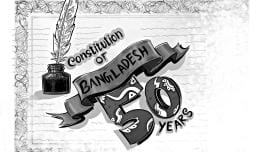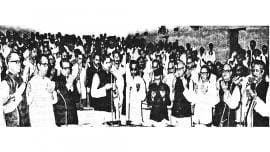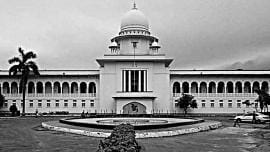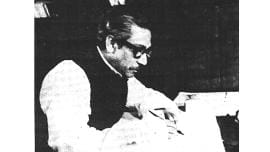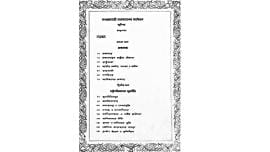A constitution without constitutionalism?
3 November 2022, 18:00 PM
50 years of our Constitution: Original ideals vs reality
The voices of dissent in the Constituent Assembly of Bangladesh: Sengupta, Larma and Chowdhury
3 November 2022, 18:00 PM
50 years of our Constitution: Original ideals vs reality
How far have we ensured judicial independence in Bangladesh?
3 November 2022, 18:00 PM
50 years of our Constitution: Original ideals vs reality
Constitutional Law of Bangladesh
3 November 2022, 18:00 PM
50 years of our Constitution: Original ideals vs reality
Constitutional supremacy: The dangers within
3 November 2022, 18:00 PM
50 years of our Constitution: Original ideals vs reality
Independence of judiciary: CA debates and later developments
3 November 2022, 18:00 PM
50 years of our Constitution: Original ideals vs reality
Property rights and their legal protection: The constitutional perspective
3 November 2022, 18:00 PM
50 years of our Constitution: Original ideals vs reality
Human Rights in the Constitution of Bangladesh
3 November 2022, 18:00 PM
50 years of our Constitution: Original ideals vs reality
Constitutional borrowing and transplants
3 November 2022, 18:00 PM
50 years of our Constitution: Original ideals vs reality
Bangladesh began badly: Remembering the roots of the impasse
3 November 2022, 18:00 PM
50 years of our Constitution: Original ideals vs reality
A constitution without constitutionalism?
The celebration of the 50th anniversary of the adoption of Bangladesh Constitution provides an opportunity to examine whether the country practised constitutionalism since the constitution came into effect.
3 November 2022, 18:00 PM
The voices of dissent in the Constituent Assembly of Bangladesh: Sengupta, Larma and Chowdhury
Of all the members of the Constituent Assembly of Bangladesh, Suranjit Sengupta, Manabendra Narayan Larma, and Mohammad Abdul Aziz Chowdhury deserve a special mention for their distinguished role in the making of the Constitution.
3 November 2022, 18:00 PM
How far have we ensured judicial independence in Bangladesh?
The judiciary is the last hope for restoring the rights of citizens in a country. However, judiciary cannot act to restore these rights unless and until it is free from any undue influence and interference of any other organ.
3 November 2022, 18:00 PM
Constitutional Law of Bangladesh
Bangladesh enacted and implemented its Constitution in 1972 featuring parliamentary democracy. Since then, the constitutional rule of law has had a turbulent journey.
3 November 2022, 18:00 PM
Constitutional supremacy: The dangers within
The “idea” of a constitution may be old. After all even Aristotle had written about them.
3 November 2022, 18:00 PM
Independence of judiciary: CA debates and later developments
The judiciary of a modern state is assigned with the responsibility of ensuring the rule of law, human rights, and administration of justice. In developing democracies like Bangladesh,
3 November 2022, 18:00 PM
Property rights and their legal protection: The constitutional perspective
What we are is our “culture” and we expect to protect our rights through law. In other words, we expect to enjoy
3 November 2022, 18:00 PM
Human Rights in the Constitution of Bangladesh
As Bangladesh celebrates the golden jubilee of its adoption of the Constitution, I shall investigate the Constitutional framework of human rights in Bangladesh in this short piece with a brief historical anecdote.
3 November 2022, 18:00 PM
Constitutional borrowing and transplants
When modern constitutional ideas and concepts had already been well seasoned and developed, the Bangladesh constitution emerged in 1972,
3 November 2022, 18:00 PM
Bangladesh began badly: Remembering the roots of the impasse
Nationalism is not a political doctrine, not a programme. If you truly want your country to avoid regressing, halting, failing, it is necessary to march past national consciousness to political and social consciousness.
3 November 2022, 18:00 PM
